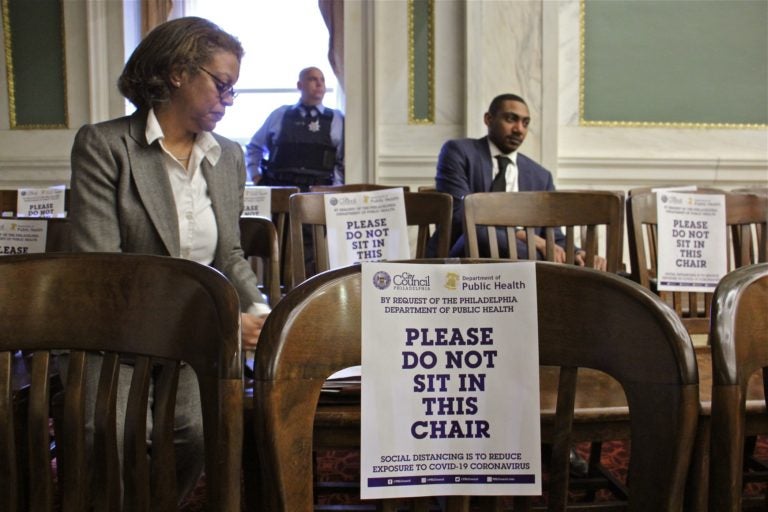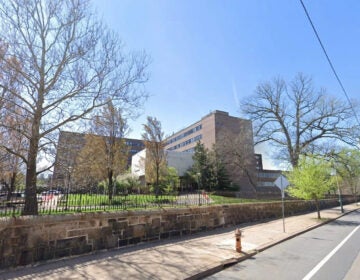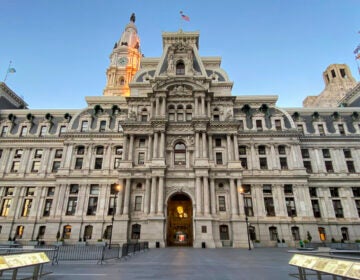Philly Council advances $85.4 million coronavirus emergency spending bill
The taxpayer money will be spent on city payroll and operating testing sites as well as other emergency operations.

At a March 12 Philadelphia City Council meeting, attendees were told to use every other chair to reduce the chances of exposure to coronavirus. (Emma Lee/WHYY)
Philadelphia’s $85.4 million emergency coronavirus spending bill is expected to pass next week with $400,000 earmarked for City Council to use in their districts for messaging about social distancing in their communities.
“We all have our various constituencies and we need to reach everybody in every meaningful way,” said City Council President Darrell Clarke.
The bill was amended on the floor to include the appropriation.
Council believes that its members are trusted voices in their communities who can help get the message out about social distancing in ways that the media and the city’s Department of Public Health can’t.
“We need to be in a position to be out in neighborhoods,” said Clarke. “Too frequently, we hear people saying they don’t get that information as a result of the traditional methods of media. We have to be a little more creative.”
The money, which will come out of the city’s general fund, could be spent on outreach efforts like robocalls, billboards, social media, and mailers to both promote public health and warn residents of potential pandemic-related scams.
The rest of the $85 million package is slated to go to the Managing Director’s Office to cover city payroll costs, external contracts, material costs, taxes, and indemnities. While $10 million will go towards taxes and indemnities, the other $75 million will go towards employees and those other operational costs, divided into three $25 million chunks.
“Today our job is to make sure we don’t leave those first-line responders holding the bag,” said Councilmember Curtis Jones. “I want to shout out the city workers who are doing their damndest to make sure this city doesn’t fall apart.”
A memo circulated to City Council included more insight into the material costs the city is facing.
The testing facilities operated by the city, including the one in the Citizens Bank Park parking lot, could cost $500,000 a month to operate. Masks for city workers are needed at the rate of 10,000-to-30,000 a day.
The city has contracted with an outside vendor for 500,000 at the cost of $5.65 per mask, a jump from $1 apiece before the crisis.
Individual donations of masks to the city have been small, with only 20 given so far.
A pall of uncertainty hangs over the city’s coffers in the midst of the pandemic.
Mayor Jim Kenney has dismissed questions about plans for budgeting and other financial impacts. In briefings, he has told reporters it is far too soon to say what the impact of the pandemic will be and emphasized how utterly essential federal aid will be to local governments.
“We are providing whatever resources we can reasonably, without bankrupting the city and setting us back to the bad old days of fiscal crises,” said Kenney at a briefing Tuesday. “Unlike the federal government, we don’t print money. We are looking at the numbers every day, but speculating about days, a week, a month from now is impossible.”
The $2 trillion stimulus proposed at the federal level could provide some relief, but it is still unclear how much. Council President Clarke said he’d heard an estimate that $5 billion would be going to Pennsylvania, but he was unsure of the amount being allocated to Philadelphia.
Councilmember Jamie Gauthier asked during Thursday’s hearing about the city’s rent subsidy and cash assistance pilot programs, both of which were unveiled earlier in 2020 before the pandemic.
“Before this crisis, we were ready to move on a shallow rent subsidy and a basic income program and those tools are needed now more than ever,” said Gauthier. “We need to get some assistance to individuals [as well as businesses].”
Gauthier has noted that $5 million could provide $300 each to 16,666 Philadelphians, a point included in the memo circulated. The federal government needs to lead, she said, but the city could act as a stopgap.
Gauthier held a meeting of Council’s housing committee and members of the Kenney administration earlier to discuss the issue. The group is analyzing where the money for expanded versions of these aid programs could, in theory, come from.
“We have mechanisms that already work and could get money out, we have to agree with the administration about what the amounts are,” said Councilmember Maria Quiñones-Sánchez. “I know that there was a request from the administration as part of their budget for rental assistance. All of us are committed to that and we will work with the administration and prioritize who we want to help.”
WHYY is your source for fact-based, in-depth journalism and information. As a nonprofit organization, we rely on financial support from readers like you. Please give today.




![CoronavirusPandemic_1024x512[1]](https://whyy.org/wp-content/uploads/2020/03/CoronavirusPandemic_1024x5121-300x150.jpg)



